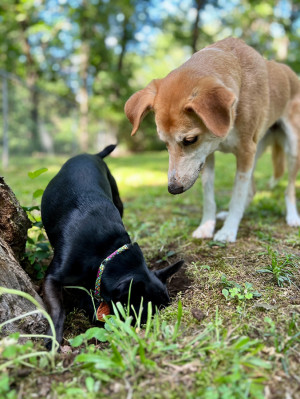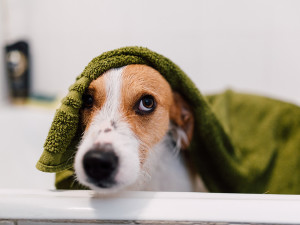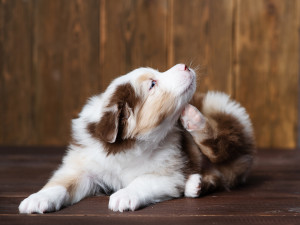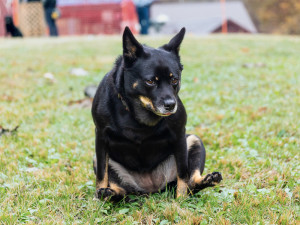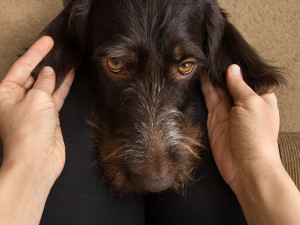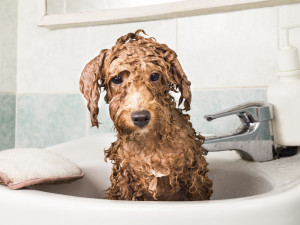Scooting After Pooping: Weird Things Dogs Do Explained
Dog trainer Emma Bowdrey helps explain this common canine behavior.
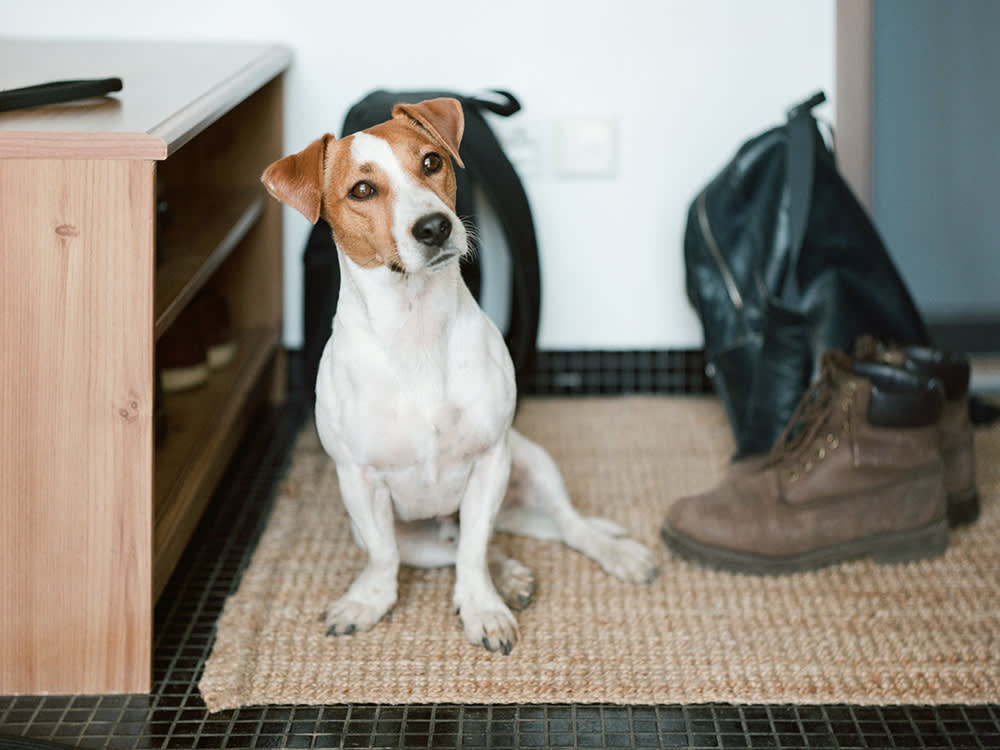
Share Article
Dogs do many adorable things — butt scooting is not one of them. However, as off-putting as it might be, dogs are usually just carrying out very instinctive animal behaviors. Dogs are dogs at the end of the day. Understanding why dogs do particular behaviors, like butt scooting, will make it easier to know what weird behavior is actually pretty normal and what is not.
So, why do dogs scoot their butts on the floor?
Commonly known as butt scooting, seeing a dog drag their bum across the ground can be kind of a comical sight…when outside. But on the carpet, it is a different matter. And what if that carpet is at your in-law’s house? Well, that’s not so funny.
Dogs scoot in almost all cases because something is irritating their anus. The causes range from something as simple as an itch to more serious issues such as worms, wounds, or tumors. It is important to take your dog to the vet to rule out any medical causes and to treat any underlying conditions. There are also a few things you can do at home to help prevent your dog from scooting, such as keeping their anal area clean and free of debris.
Common causes of butt scooting:
Irritated butt
Dirt or debris
Infected anal sacs
Anal gland rupture
Anal gland tumors
Worms or parasites
Skin allergies
If my dog is scooting does it mean there is a medical problem?
It could be an issue with your dog’s anal glands: You might not know that your dog has them just inside the rectum. These glands secrete a liquid with unique scent characters that identify one dog from another and provide other information. When dogs greet each other, they are sniffing these glands. Unfortunately, it’s these glands that can often cause a problem.

Can you cure dog scooting?
Treatment for dog scooting really depends on what’s causing your beloved dog to drag their butt. Here are some of the most common causes:
Irritated butt
If your dog regularly collects small amounts of poop on their butt (yep, we’re talking dingleberries), you should clean the area when returning from walks. It is important to keep their butts clean, as it prevents bacteria from going back into the anal passage and infections from occurring, and it can also cause itchiness. Dogs that have been recently groomed can also feel discomfort or itchiness.
Dirt or debris
Sometimes dogs will scoot their butt to remove dirt or debris that has collected there on a walk or hike. If they only scoot a few times and it doesn’t continue, it shouldn’t be an ongoing problem.
Infected anal sacs
One common cause of continuous scooting is a problem with your dog’s anal sacs. If you can smell a foul odor coming from this region or see bleeding, this generally indicates that the anal glands are impacted or infected, and you should visit your vet. Some dogs need to have their anal sacs drained regularly. If these glands get blocked, the secretion is unable to be expressed. Once squeezed, the impact on your dog’s scooting is immediate.
Anal gland rupture
Unfortunately, anal glands can become infected if the fluid doesn’t empty normally. When this happens the fluid can become bloody and may fill with pus and become an abscess. It will look red and swollen around your dog’s anus — if it bursts (or ruptures) and goes untreated, it can cause damage to your dog’s anus and rectum. Take your dog to the vet immediately if you suspect this is the case.
Anal sac tumors
Anal sac tumors are relatively uncommon in dogs, though they do occur more in Spaniel breeds. The tumor is made up of cells from the glands of the anal sac, and is usually discovered during an annual vet examination. They can metastasize — or spread elsewhere in the body — so it’s important to detect them early. Symptoms may include blood in the stool, swelling in the area and — you guessed it — butt scooting.
Worms or parasites
When inspecting at home, if you see tiny white specs that resemble grains of rice, it is likely your dog has tapeworms. Tapeworms cause a lot of irritation and discomfort for your dog. Unlike worms, you might not be able to see other parasites. If your dog is dragging their bum along the ground more than once or twice a week, accompanied by licking, biting, and generally seeming agitated, you should visit the vet.
Skin allergies
Allergies might be another source of butt scooting if your dog seems excessively itchy in other areas. Whether they’re food or environmental allergies, they can cause itchiness in the anal area. In this case, scooting is a form of scratching.
Are there home remedies for dog scooting?
There are a few natural remedies that can ease your dog’s discomfort, if you feel comfortable administering them at home: warm compresses applied to the area can alleviate inflammation and soothe your pup’s butt. Ingredients such as colloiIdal oatmeal and aloe vera can also help alleviate itching if that’s the cause of your dog’s butt scooting.
Be sure to check your pup’s rear.
If you suspect that there is something more to your dog’s scooting than an itch or an attempt to clean more thoroughly after a bout of diarrhea, you can check your dog’s bum before going to the veterinary clinic. Make sure that you use gloves and lift your dog’s tail. The anus should be clean and free from any smells.
FAQ (People also ask):
Why is my dog still scooting after their glands have been expressed?
Some dogs will still scoot for a few days after their glands are expressed because the area is still irritated. But if it persists after three days, there may be another cause to address.
Why does my dog scoot after pooping?
Your dog may be trying to literally wipe their own butt by scooting — to remove any poop remnants, as well as any dirt or debris that’s accumulated in that area.
How can I keep my dog from scooting after surgery?
You want to make pooping as easy as possible, and reduce your dog’s overall movement—so feeding high-quality food and keeping them entertained with stationary toys can help.
References:

Emma Bowdrey, ISCP
Emma Bowdrey is an ISCP-trained Dog Trainer based in Prague, where she lives with her adopted greyhound, Swift. Emma has worked with dogs since gaining her qualification in Canine Behaviour & Psychology and now runs her own business - Four Long Legs. Emma uses positive reinforcement methods to make each hound a happy one.
Related articles
![A black dog with a tilted head looks attentively at the camera while sitting in grass.]()
Is My Dog’s Poop Normal?
From bloody poop to diarrhea—all your dog’s poop problems explained.
![Pug dog scooting on a wooden floor in the kitchenFunny dog enjoying scratching his bum on grass at public dog park.]()
Home Remedies For Dog Scooting
A vet on what to do when “anal sacs go bad.”
![Dog laying his head on owners lap while owner holds his ears.]()
DIY Physical Exam Part 2 — How to Check Your Dog for Infections
Veterinarian Dr. Shea Cox on how to assess your dog’s eyes, ears, nose, and mouth.
![A dog getting his face scrubbed with soap.]()
7 Ways Baking Soda Can Keep Your Dog (And Your House) Clean
This pantry staple is about to become your new secret cleaning weapon.
